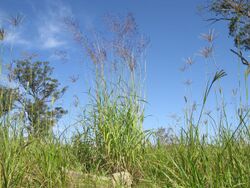Biology:Capillipedium spicigerum
| Capillipedium spicigerum | |
|---|---|

| |
| Scientific classification | |
| Kingdom: | Plantae |
| Clade: | Tracheophytes |
| Clade: | Angiosperms |
| Clade: | Monocots |
| Clade: | Commelinids |
| Order: | Poales |
| Family: | Poaceae |
| Subfamily: | Panicoideae |
| Genus: | Capillipedium |
| Species: | C. spicigerum
|
| Binomial name | |
| Capillipedium spicigerum S.T.Blake
| |
Capillipedium spicigerum, commonly known as scented-top grass,[1] is a species of perennial grass in the family Poaceae that is native to Australia.
Description
Capillipedium spicigerum is a tufted perennial bunchgrass, without stolons or rhizomes. The culms, or stems of the grass grow to 1.5 m (4 ft 11 in) in height and have hairy nodes.
The lower leaf sheaths of the plant are silky hairy. The leaf blades are 30–40 cm (12–16 in) long and 5–8 mm (0.20–0.31 in) wide at the base.[2]
The inflorescence of the plant, or the collections of flowers, are a purplish open panicle, 10–20 cm (3.9–7.9 in) long with short racemes on slender branches. The flowers emit a scent when crushed. The racemes have 3 to 8 pairs of spikelets, one stalked the other unstalked. Flowering is late spring to autumn.[3]
A close relative to Capillipedium spicigerum seems to be C. mistryi A. P. Tiwari & Landge from India. For more details refer to [4][5]
Taxonomy
Capillipedium spicigerum was described by S.T. Blake in 1944.[6]
Habitat and ecology
Capillipedium spicigerum is found on lower fertility soils of roadsides, native pastures and woodlands[3] of Queensland, New South Wales, and the Northern Territory.[1] C. spicigerum is very drought tolerant and readily grazed.[3]
References
- ↑ 1.0 1.1 "Capillipedium spicigerum". PlantNET - New South Wales Flora Online. Royal Botanic Gardens & Domain Trust, Sydney Australia. http://plantnet.rbgsyd.nsw.gov.au/cgi-bin/NSWfl.pl?page=nswfl&lvl=sp&name=Capillipedium~spicigerum. Retrieved 3 April 2019.
- ↑ Fairley, Alan; Moore, Philip (1995). Native Plants of the Sydney District: An Idendification Guide (1st ed.). Crows Nest, New South Wales: Kangaroo Press. p. 351.
- ↑ 3.0 3.1 3.2 Rose, Harry; Rose, Carol (2012). Grasses of Coastal NSW (1st ed.). Paterson NSW: Department of Primary Industries. p. 102. ISBN 9781742562605.
- ↑ Landge, Shahid Nawaz (May 2023). "On the taxonomic identity of Capillipedium mistryi A. P. Tiwari & Landge (Poaceae: Andropogoneae) and synonymization of C. yashwantraoi Tarbej & Potdar as its new heterotypic synonym". Nordic Journal of Botany 2023 (6): e03986. https://onlinelibrary.wiley.com/doi/10.1111/njb.03986.
- ↑ Tiwari, Arjun (April 2021). "Capillipedium mistryi (Andropogoneae, Poaceae): a new remarkable species from central India". Phytotaxa 498 (1): 051-057. https://doi.org/10.11646/phytotaxa.498.1.6.
- ↑ "Capillipedium spicigerum". Australian Plant Name Index (APNI), IBIS database. Centre for Plant Biodiversity Research, Australian Government, Canberra. https://biodiversity.org.au/nsl/services/rest/name/apni/93932/api/apni-format. Retrieved 3 April 2019.
Wikidata ☰ Q15511394 entry
 |

